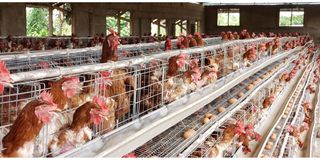Poultry farmers advised to discourage battery cages

Poultry farming has gained a rapid increase in cities like Dar es Salaam whereby many people are rearing chicken at their homes for business purposes, especially ones laying eggs.
Nature of cities has prompted farmers to use battery cages to rear chickens due to either having limited space for keeping them or lacking knowledge about the disadvantages of using those cages.
United Kingdom and the European Union countries have begun banning eggs and poultry products raised via the battery cage system.
Kenya, Uganda, Rwanda and Tanzania are now running a campaign to get rid of the system in order to benefit from the foreign markets as well as preserving and respecting the rights of animals in their respective countries.
Tanzania Animal Welfare Society (Taweso) in collaboration with Africa Network for Animal Welfare (ANAW) are advocating for a free range or deep litter system because they found out that it is more advantageous than the cage system.
Taweso Livestock Field Officer, Mr. Baraka Mbise says that the battery cage is designed to house laying hens. After attaining the maturity which usually takes about 18 weeks, they are taken to the cages where they will spend the remainder of their lives, which generally last for about two years.
He says that this method has become very common among farmers in cities because they aim at increasing production while compromising the welfare of chickens.
“Most of poultry farmers think that using cages is modernity but there are more animal welfare concerns. We are creating awareness to them on this, with time they will understand,” says Mr. Mbise.
Mr. Mbise agrees that there are few benefits of using cages like increased hygiene resulting in a much lower incidence of diseases, preventing cannibalism or vices, ease to monitor the birds and it reduces social friction because cages use a small area.
Besides, he notes that disadvantages of using cages are more than the advantages, which is why they are advocating against the use of cages in favor of free range system which allow chicken to
“Deep litter systems or free range systems accommodate most of the welfare concerns that are found in battery cage housing systems. They provide physical space and greater environmental complexity including litter, perches, dust-bathing, pecking, scratching behaviors and egg laying facilities like nest boxes,” he says.
Some of the disadvantages noted by the expert are like psychological problems, that cages prevent chickens from engaging in most of their natural behaviors including perching, roosting, and dust-bathing and foraging.
Also, lack of nesting opportunities results in severe frustration for many birds each time an egg is laid because it prevents the nesting behaviors of the chickens to be displayed.
“Under normal circumstances, hens search out private places in order to construct nests before laying eggs. In battery cages, these desires are muted, manifesting instead as repetitive stress-induced behaviors such as pecking at other chickens,” says Mr. Mbise.
Caging causes Osteoporosis disease which is attributed to lack of adequate movement and exercise, and it is a common condition among many species of captive animals.
“In caged hens, this degenerative disease is a widespread problem. The inability to walk more than a few paces, to run, or even to properly stretch their wings leads to bone fragility and fractures, especially during transport,” he added.
Mr. Mbise notes that cages cause physical trauma to the birds in the sense that the wire mesh floors of battery cages can cause a host of foot disorders, including toe pad hyperkeratosis, which develops due to pressure on certain areas of the feet.
“This condition can lead to painful open lesions on their feet, overgrown claws are also common, since chickens cannot engage in ground scratching behaviors that keep nails short naturally,” he says.
Other common disadvantages are: cages are very expensive and they are not found everywhere and some of the cages are not galvanized, this leads to rusting.
“Feed and housing are two main factors of successful poultry farming business. Housing is important for raising chickens either commercially and in even in small scale farms.
“A good poultry house system keeps the bird safe, well growing, productive and protects the chickens from adverse weather conditions, injury and predators,” Mr. Mbise told The Citizen reporter.





